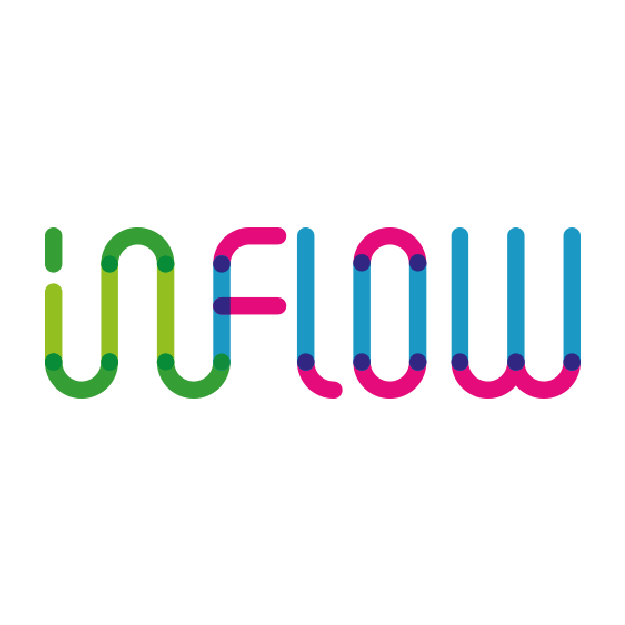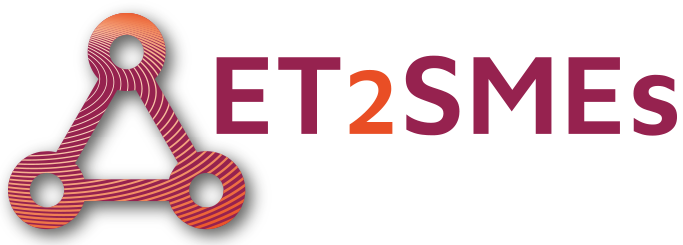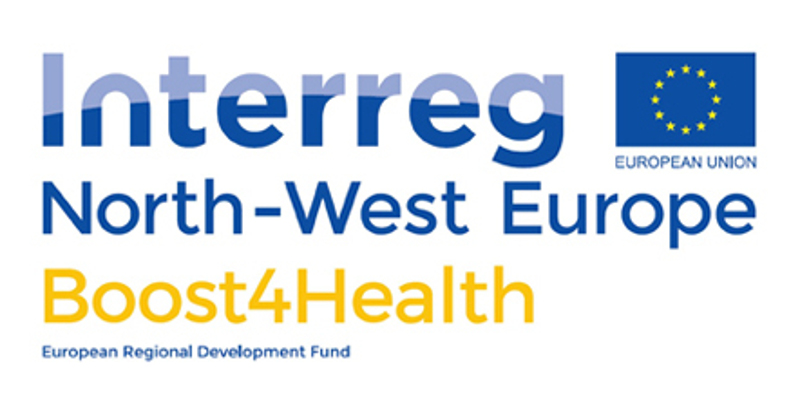European projects for innovation support
IN FLOW

IN FLOW is an innovative 3 year-R&D project involving 4 leading partners from the Euregio Meuse-Rhine (EMR) (University of Liège, Maastricht University, Sirris, DWI-Leibniz Institut für Interaktive Materialien) for the formulation, characterisation and engineering of biochemical products. Its main challenge is to introduce new (bio)degradable packaging technologies for the fast and cheap formulation of active ingredients in pills or creams, for example. The methodologies applied will allow companies to create new products with high potential for, among others, the health care and personal care industry.
The current knowledge (TRL3) is partly the result of a previous Interreg IV-A BioMIMedics project involving strong collaboration between 3 of the partners. The IN FLOW knowledge and technology (TRL6) will enable public and private actors to introduce their products more rapidly to the market. The technology uses state-of-the-art devices and know-how developed in-house to create new (bio)degradable formulations encapsulating an active ingredient. These capsules can be used in end products such as pills, for application areas in the health, nutraceutical, cosmetic and pharmaceutical industries.
The IN FLOW project is carried out within the framework of the Interreg V-A Euregio Meuse-Rhine Programme, with €2.1 million from the European Regional Development Fund (ERDF). By investing EU funds in Interreg projects, the European Union invests directly in economic development, innovation, territorial development, social inclusion and education in the Euregio Meuse-Rhine.
Contact : Annick PIERRARD

E-TEST


The Einstein Telescope will open a new window on the Universe through the observation of gravitational waves. Its infrastructure will be buried 300 meter below the surface to reduce human-, wind- and ground-induced vibrations and movements. The Interreg project E-TEST is a very important step of the Einstein Telescope, as it will be a proof of concept, both on the prototype side and on the geological side.
E-TEST will build a prototype – a large suspended mirror at cryogenic temperature (10Kelvin) – to validate the telescope’s technology.
E-TEST will also run an underground study to map and model the geology of the Euregio Meuse-Rhine.
This will allow to define the optimal design and location of the future Einstein Telescope.
This project is a major scientific breakthrough but will also have a significant economic impact on the SME of the EMR.
11 partners in Belgium, the Netherlands and Germany
The E-TEST project will be coordinated by the University of Liège through the service RISE / the Knowledge Transfer Office of ULiège (Annick Pierrard, senior Interreg Project Manager), led scientifically by researchers from ULiège (Professors Christophe Collette, Jérôme Loicq and Frédéric Nguyen), and managed by a consortium of 11 partners in Belgium, the Netherlands and Germany:
University of Liège (Aerospace & Mechanical Research Units (A&M) and Urban and Environmental Engineering (UEE) / Faculty of Applied Sciences / Centre Spatial de Liège (CSL) / UR GEOLOGY / Faculty of Sciences / STAR Research Institute), Fraunhofer ILT, RWTH Aachen, UHasselt, KU Leuven, NWO-I/Nikhef, UniBonn, NMWP Management GmbH, KNMI, Maastricht University and UCLouvain.
This consortium will also be complemented by a network of satellite partners including the Université Libre de Bruxelles, the Vrije Universiteit Brussels, the University of Ghent, the University of Antwerp and the University of Mons.
In addition to university partners and research centres, a significant number of Belgian, German and Dutch companies are supporting this initiative, which will have a strong economic and social impact in many sectors.
The E-TEST project is carried out under the Interreg V-A Euregio Meuse-Rhine Programme, with €7.5 million from the European Regional Development Fund (ERDF).
The Walloon Region contributes to 40% of the funding of the Walloon partners in this project.
By investing EU funds in Interreg projects, the European Union invests directly in economic development, innovation, territorial development, social inclusion and education in the Euregio Meuse-Rhine.
Contacts
Annick PIERRARD - Senior Interreg Project Manager - RISE-Université de Liège / The Knowledge Transfer Office of ULiège
Christophe COLLETTE - Research Unit Aerospace & Mechanics Faculty of Applied Sciences
Jérôme LOICQ - Research Units Aerospace & Mechanics / STAR Research Insitute / Centre Spatial de Liège
Frédéric NGUYEN – Urban and Environmental Engineering (UEE) Research Unit - Faculty of Applied Sciences
ET2SMEs
The aim of this project is to bring the Einstein Telescope, for which the extended Euregio Meuse-Rhine is competing with excellent chances in the ESFRI call, closer to the SMEs/companies of the region in particular, and to involve them directly in terms of technological development and economic exploitation. The most important concern is to stimulate innovation-oriented cross-border cooperation between technology-based companies and to produce targeted innovations that are significant not only for the Einstein telescope, but also for other demanding applications and markets.
The project is based on a strong consortium of actors from the different regions of the Euregio Meuse-Rhine :
- Aachener Gesellschaft für Innovation und Technologietransfer mbH
- SKYWIN Wallonie
- NMWP Management GmbH
- LIOF
- University of Liège – RISE
- Provinciale ontwikkelingsmaatschappij (POM) Limburg
- Sowalfin
The ET2SMEs project is being carried out under the Interreg V-A Euregio Meuse-Rhine programme, with 1.15 million euros from the European Regional Development Fund (ERDF). By investing European funds in Interreg projects, the European Union is investing directly in economic development, innovation, territorial development, social inclusion and education in the Euregio Meuse-Rhine.
Contacts
Annick PIERRARD - Senior Interreg Project Manager - RISE-Université de Liège / The Knowledge Transfer Office of ULiège
Cédric LENAERTS - Research Units Aerospace & Mechanics / STAR Research Insitute / Centre Spatial de Liège
Christophe COLLETTE - Research Unit Aerospace & Mechanics Faculty of Applied Sciences
Frédéric NGUYEN – Urban and Environmental Engineering (UEE) Research Unit - Faculty of Applied Sciences

euPrevent PROFILE

In April 2021, euPrevent started a two and a half year project called euPrevent PROFILE (prevention of loneliness of elderly people in the Euregio). This project is a collaboration between different partners of the Euregio Meuse-Rhine (EMR). PROFILE focuses on preventing and combating loneliness among older people and on raising awareness of the effects of loneliness.
The objective of euPrevent PROFILE is to promote knowledge and exchange of good practices between and within communities. PROFILE will stimulate cross-border cooperation with the aim of preventing and combating loneliness among older people, promoting the exchange of knowledge, good practice and implementation, increasing awareness of the effects of loneliness and linking people, experts and organizations that have already been active in this field.
As a project partner, the University of Liege is involved in the euPrevent PROFILE project in different ways. On the one hand, in the field of knowledge exchange, the University of Liège is involved in a literature review, the drafting of guidelines, the development of training courses, etc. On the other hand, it acquires the knowledge and skills needed to implement the project. On the other hand, it also acquires new knowledge from the other partner organizations.
The euPrevent PROFILE project is being carried out within the framework of Interreg V-A Euregio Meuse-Rhine, with 740,085.- € from the European Regional Development Fund. The project is also co-financed and the project partners make their own contributions.

KIC Raw Materials
ULiège is founding member (core-partner) of the KIC (Knowledge Innovation Community), founded on the initiative of the EIT (European Institute for Technology), and part of the CLC (Co-Location Center) West Europe.
The KIC includes more than 100 partners, which are mainly large companies, universities and research centres.
The Urban & Environmental Engineering (UEE) Department and, in particular, the GEMME unit, is the main operator of this partnership.
BusyBee
Busybee is a project developed as part of the Eurogio Meuse-Rhine (EMR) with 5 Belgian partners (ULiège, PIMW, Univ.Hasselt, Katholieke Univ. Leuven, DSP Valley VZW) and 4 Dutch partners (Univ.Maastricht, Technische Univ. Eindhoven, Stichting DSP Valley).
The objective of this project is to transform more innovations into new products and to lead them to the market in order to reinforce the commercial activity of SMEs and to have a direct economic impact within the EMR zone.
This project, which is aimed at the TRL (Technology Readiness Level) levels 4 to 6, is submitted in collaboration with the EarlyTech projects (ET, TRL from 1 to 3) and Innovation2Market (I2M, TRL from 7 to 9) in order to effectively support businesses, regardless of their technological needs.
The BuSyBee project carried out within the framework of the Interreg V-A Euregio Meuse-Rhine programme is financed at 1.6 million euros by the European Union and the European Regional Development Fund (ERDF), Wallonia, Flanders, the Province of Flemish Brabant, the Province of Dutch Limburg, the Province of Dutch North Brabant, as well as the project partners.

Boost4Health
Boost4Health started out in May 2016 and has for objective to facilitate the internationalisation of European SMEs within the field of life sciences/health through the construction of a favourable ecosystem and a dedicated support programme. For this, the partners will need to implement a support mechanism for SMEs from the health sector into their strategies of European partnerships and internationalisation.
The SMEs will thus be able to benefit from:
- Mobility aids
- Aid in exploring a new market
- Access to the European network for the validation of health products
- Individual support from a specialised "coach" for international development
- Event programmes in order to facilitate partnerships
Contact: Annick PIERRARD
WearIT4Health
WearIT4Health stems from a former project from Interreg IVA Top Technology Cluster (TTC) having for objective to create new collaborations between research institutions and SMEs, late 2014.
The objective of the WearIT4Health project is the creation of a portable multi-sensor monitoring device that is comfortable for hospitalised patients and compatible with the IT infrastructure of hospitals in the Euregio Meuse-Rhin.
The project is based on a solid consortium bringing together actors from different regions of the Euregio Meuse-Rhin; their knowledge and know-how are high level and complementary. The monitoring device that will be developed will record vital medical data continuously and analyse it to help the health care team make the most appropriate decision for the patient. The final TRL of the monitoring device will be TRL 5 level or beginning of TRL 6 level.
Contact: Annick PIERRARD

WEARIT4COVID
During the first COVID-19 outbreak in Europe, hospitals faced an acute demand for (ICU) beds and a high workload for personnel under difficult circumstances. The disease proved to be unpredictable and heterogeneous in its expression and course and to require a long hospital stay. COVID-19 patients typically deteriorate very rapidly, leaving little time to initiate (oxygen) therapy, and prepare patients and relatives for potential ICU admission.
Care professionals reported they could not rely on clinical signs in predicting deterioration and making medical decisions. General nursing wards are not equipped for advanced monitoring; the standard of care consists of intermittent manual measurement of vital signs only 1-3 times a day. However, continuous measurement is crucial for early detection of deterioration and minimizes undesirable physical contact. In particular, respiratory rate (RR), oxygen saturation (SpO2), heart rate (HR), and variability (HRV) are identified as important parameters in COVID-19. Anticipating a potential second COVID-19 outbreak, decision support for timely escalation to medium or intensive care is urgently needed.
The need for in-hospital continuous vital signs monitoring was already addressed in the ongoing Interreg EMR project wearIT4health, in which a prototype of a decision support system at technology readiness level (TRL) 5 was developed and is currently tested in hospitals.
It consists of:
- A wearable continuous monitoring device measuring: ECG and PPG (to determine HR(V), RR, SpO2, blood pressure), activity & temperature
- Algorithms that, based on these parameters, estimate Early Warning Scores (EWS) to support care professionals in daily practice
- A monitoring platform to integrate the device parameters into hospital IT systems to be viewed and used by care professionals
The wearIT4COVID project, coordinated by the University of Liège, is based on a strong consortium of actors from the different regions of the Meuse-Rhine Euregio whose knowledge and know-how are of a high level and complementary:
- ULiège – RISE (Coordination)
- ULiège – Laboratoire Microsys (Lead Partner scientifique)
- CHU de Liège
- Maastricht UMC+/azM (Hôpital universitaire)
- Université de Maastricht
- KU Leuven
- Université de Hasselt
- Ziekenhuis Oost-Limburg
The wearIT4COVID project carried out within the framework of the Interreg V-A Euregio Meuse-Rhine programme is financed at 1.1 million euros by the European Union and the European Regional Development Fund (ERDF) as well as the project partners.

IMPACT


At a time when technologies are increasingly investing society and when art seems to be concerned with the issue of creative technologies and digital cultures, IMPACT is considering placing the performing arts in the field of new technologies, digital and media arts.
The IMPACT project (International Meeting in Performing Arts and Creative Technologies) is based on cooperation between the cultural, research, business and training sectors.
The field of contemporary artistic creation is one of these sectors in which the culture of innovation and disruptive strategies find a favourable ground for their development. The fundamentally transdisciplinary nature of contemporary creation, and of the performing arts in particular, leads us to believe that they can set an example to be followed as part of the development of a global strategy in favour of both social and technological innovation.
From 2016 to 2019, the IMPACT project (International Meeting in Performing Arts and Creative Technologies) has received support from the INTERREG V-A Euregio Meuse-Rhine cooperation programme, Wallonia and the Deutschsprachige Gemeinschaft Belgiens.
The main objective of IMPACT was to set up the first a euregional and cross-sectoral cluster for cooperation, research and development, production and dissemination in the field of new technologies and the performing arts. IMPACT is taking action on the territory of the EUREGIO Meuse-Rhine between Hasselt, Maastricht, Eupen, Liege, Aachen and Düren.
Goal
- Develop an art / science / technology pole for production, research and training
- Develop cross-sectorial innovation and cross-fertilization in Art/Science/Technologies
- Increase the innovative potential of SMEs and research centers.
- Developing the growth potential and attractiveness of the cultural and creative industries sector and new technologies (culture as a new market)
Partners
Théâtre de Liège (Lead Partner), Université de Liège – RISE, Cultuurcentrum Hasselt, PXL MAD Faculty – Hasselt, Université de Hasselt – EDM/IMINDS, Jazz Maastricht, Chudoscnik Sunergia Eupen, Universiteit Maastricht – UNU MERIT, Regina e.V – RWTH Aachen, KulturBetrieb Stadt Aachen
The Interreg V-A Euregion Meuse-Rhine (EMR) programme invests almost 100 million euros in the development of the Interreg-region until 2020. This area stretches out from Leuven in the west to the borders of Cologne in the east, and runs from Eindhoven in the north all the way down to the border of Luxemburg. Over 5.5 million people live in this cross-border region, where the best of three countries merges into a truly European culture.
With the investment of EU funds in Interreg projects that are conducted by project partners in the regions, the European Union directly invests in the economic development, innovation, territorial development and social inclusion and education of this region.
See the article from "Le 15ème jour"

FOOD NEXUS
FoodNexus is a European consortium of more than 70 partners, universities, multinationals, SMEs, and research centres active in the agri-food sector and bringing together the strongest European skills in the sector.
The consortium's mission is to strengthen competitiveness and agri-food innovation in Europe, while helping to solve food-related challenges: food security, sustainability, health security, and health.
This consortium, coordinated by Unilever, represents the largest partnership of the agri-food sector in Europe, and covers the entire value chain. The partners involved in Foodnexus are, among others: Cargill, Friesland Campina, Heineken, Barilla, Eurofins, Danone, INRA, Novozymes, Chr. Hansen, the University of Wageningen, the University of Bologne, l’INRA, the University of Ghent, the University of Liège…
Contact: Isabelle RAUSIN and Jérôme EECKHOUT
Business Opportunity Support System upgrade for strengthening European innovation ecosystem
Academia and private sector have joined their forces in order to strengthen the connections between education, research and business. Business Opportunity Support System upgrade for strengthening European innovation ecosystem (BOSS) project is funded with the support of the European Commission.
In today’s fast-changing society, marked by the turbulence of the economy, changeable funding conditions, technical progress, and globalization, the connections between education, research and business have become increasingly important. In order to bridge that gap, academia and private sector had recognized the need for stronger connections between education, research and business by fostering entrepreneurial mindset from teachers, researchers all the way to students.
BOSS platform aims to do the following:
- To develop Open Educational Resources in a form of Business Opportunity Self-Assessment methodology, Business Opportunity Development Planning Tool, appropriate educational material in different format, and open, automatized and web-based Business Opportunity support system (BOSS platform);
- To stimulate teachers’, researchers’ and students’ ability to initiate and carry out entrepreneurial projects, ranging from opportunity recognition to opportunity exploitation.
- To strengthen existing business opportunity, support system at partner organizations by incorporating innovative OER into existing practices, which secure efficient transfer of ideas to market and encourage university-industry collaboration;
Members of the consortium : The University of Belgrade (Belgrade, republic of Serbia), Meta Group SRL (Rome, Italy), The University of Liège
Contact : Elodie Naveau
ULiège
999976105PIC code for the submission of European projects
If you would like to know more about the funding of research projects:
- ARD Intranet
- NCP Wallonia
















